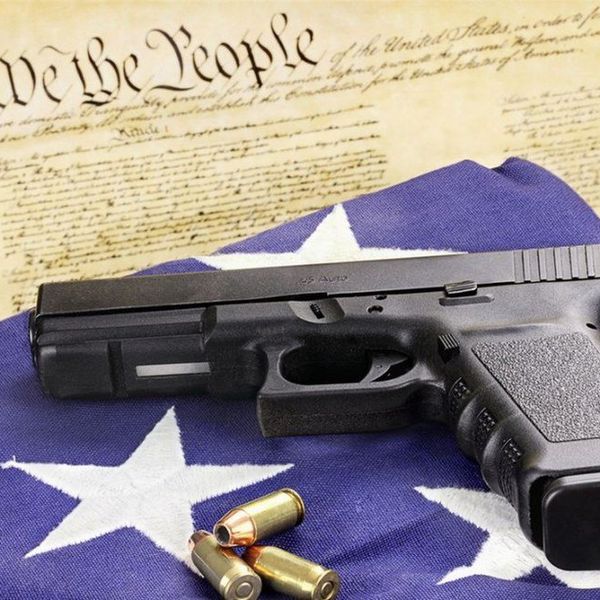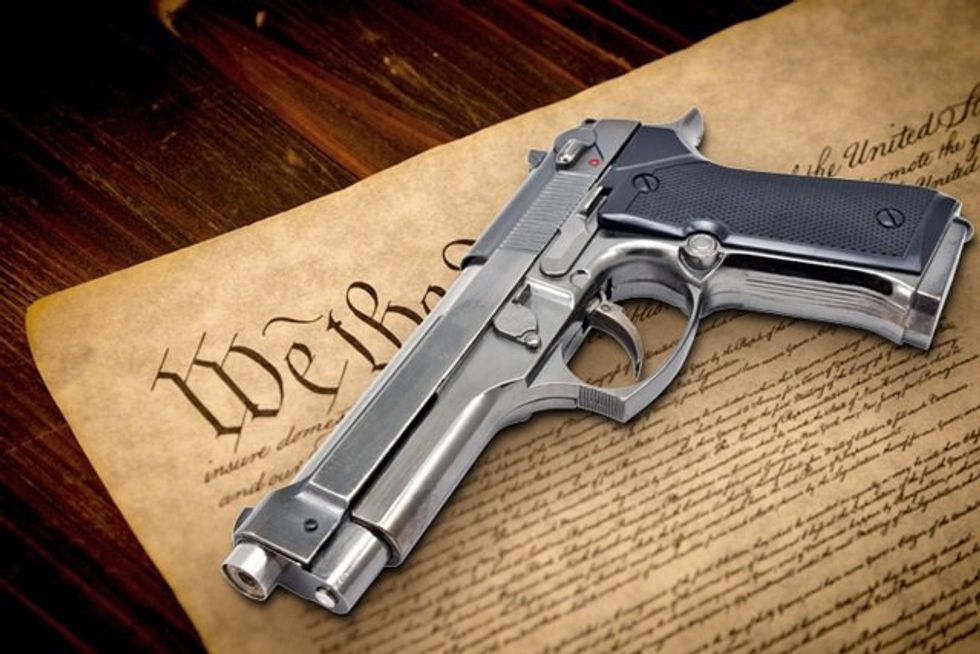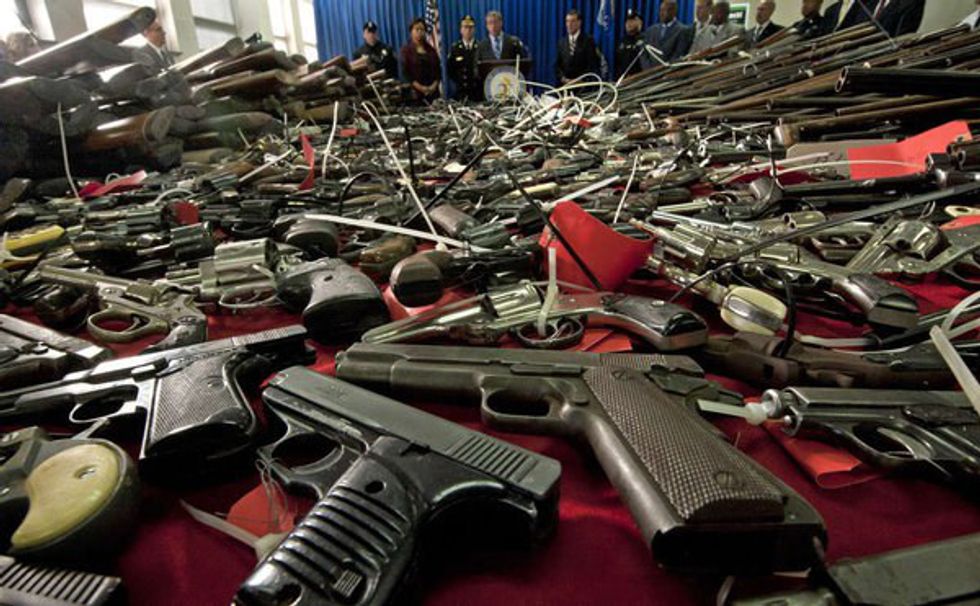On Monday, June 20th the US Senate rejected plans to tighten gun control after Republican and Democratic Senators blocked each others bills. Among the bills blocked were a bill that would ban suspects on terrorism watch lists from buying guns and a bill that would alert the FBI to terrorism suspects who purchased a gun (but not block the purchase itself). Never has such an important issue moved toward resolution so slowly, but the reasons why we cannot make any progress are not so clear. Some claim it is solely based on a divide between the two political parties, some believe that the NRA's political power may play a role, and others believe that the halt is necessary in the name of preserving certain constitutional rights. Rather than focus on one side or the other, lets take a look at all three possibilities.
Party Division
It is no secret that politicians who align themselves with the Democratic party, and those who align themselves with the Republican party, do not always agree. Our current Democratic president and the recent Speaker of the House of Representatives (republican, John Boehner) disagreed so much and so often that it even resulted in a government shutdown last year. America's gun control debate has once again highlighted these differences and how they continue to jam our political process.
Republican leaders, such as Kentucky's own Mitch McConnell, state that shootings such as the one in Orlando do not illustrate a need to tighten gun laws, but instead show that the best way to prevent attacks on our own soil is to deal with Islamic Extremism overseas. On the other hand, Democratic leaders like Harry Reid state that the Republican measures are out of step with what the American people want (polls have shown that most Americans do favor stricter buying laws and a ban on military style assault weapons).
Without bipartisan support one way or the other, the political gridlock will continue.
NRA Lobbying
Some have cited that the NRA's overwhelming political power is the driving force behind the halt in gun legislation. It is no secret that the NRA does not support tighter gun laws. The NRA's Institute for Legislative Action's executive director, Chris Cox is quoted as saying:
"It's time for us to admit that radical Islam is a hate crime waiting to happen. The only way to defeat them is to destroy them — not destroy the right of law-abiding Americans to defend ourselves." (Chris Cox, NRA)
This is far from the first anti gun control statement that Cox has made, he has made statements after almost every highly publicized mass shooting over the past few years.
They may not support gun control, but do they actually have the power to stop it?
The previously mentioned Institute for Legislative Action, which formed in 1975, is the NRA's lobbying arm. Shortly after their formation, Harlon Carter, the lobbying director at the time, led a campaign to boost membership and boosted their numbers above a staggering 4,000,000 members. Most of these members do pay a membership fee to be involved, which could be one reason the NRA is able to spend a reported $40,216,564 lobbying since 1998 and $22,272,560 in campaign contributions since 1990.
An excellent example of the NRA's power came after Bill Clinton and Congress passed a ban on on Assault Weapons in 1993. The decision was praised by democrats of the time, but may have ultimately been their demise. The ban is said to have energized the NRA who then used their massive power to contribute to a republican takeover of the House. Even Bill Clinton himself has acknowledged, if it were not for the NRA the republican takeover of the house would have likely not happened.
Constitutional Rights
Another factor that has been mentioned repeatedly by gun rights activists, is the protection of our second amendment right to bear arms. The amendment reads:
"A well regulated Militia, being necessary to the security of a free State, the right of the people to keep and bear Arms, shall not be infringed." (Second Amendment of the United States Constitution)
The language used in the amendment is the source of tremendous debate over how far these rights go. On the one hand, many believe that this language means that individuals have unlimited rights to gun ownership, and legislative bodies are not to restrict or prohibit gun ownership in any way (Individual Rights Theory). Others believe that the preface "a well regulated Militia" indicates that those who crafted our constitution only intended to restrict Congress from infringing on a states right to defend itself (Collective Rights Theory). It is true, the gun debate revolves mostly around buying laws and has nothing to do with actual gun ownership. But the ban on fully automatic rifles raises a lot of questions, and is worth talking about as well.
Historically, judges have ruled in favor of either side of the argument, only adding to the confusion. In 1939, two people were charged with unlawfully transporting an unregistered shotgun between state lines. In this case (United States vs. Miller), the judge ruled in favor of the Collective Rights Theory because the evidence did not suggest that the shotgun "has some reasonable relationship to the preservation or efficiency of a well-regulated militia..." This outlook remained unquestioned until a man by the name of Dick Anthony Heller challenged the Washington D.C. handgun ban (District of Columbia Vs. Heller). The court ruled that the second amendment "protects an individual right to possess a firearm unconnected with service in a militia, and to use that arm for traditionally lawful purposes, such as self-defense within the home." This is not the only case where the court seemed to favor the Individual Rights Theory. In 2010, a man by the name of Otis Mcdonald sought to end the Chicago handgun ban. In this particular case, not only the second amendment, but the Fourteenth Amendment were said to have been violated. In a 5-4 decision, the court decided that the second amendment applies to individual rights, and ended the handgun ban.
The core difference between both sides of the argument is subtle but also very important. Most who support gun control measures believe that law makers can take away the right to own a certain type of gun as long as it does not infringe on your overall right to own a gun, whereas those who are opposed believe that your constitutional right to own a gun can not be limited to specific styles based on the Second Amendment.
Final Thoughts
There is also some verbiage from the Declaration of Independence that is commonly cited when gun control measures are brought up, and it isn't one the mainstream media likes to talk about. Some people argue that the Declaration of Independence implies our right to revolution:
“...whenever any Form of Government becomes destructive of these ends, it is the Right of the People to alter or to abolish it, and to institute new Government.” (Declaration of Independence, 1776)
It could be said that impeding our right to own fully automatic weapons would put a civilian militia at a disadvantage against the powers that be.
Others believe that the Second Amendment is no longer valid, being that it was created during a time when civilian militias were necessary for our countries protection, and during a time when "arms" did not refer to fully automatic weapons. It is true, the creators of our constitution likely could not fathom the powerful weapons we have access to today. It could also be said that, although a fully automatic weapon could help us in the event we had to defend ourselves against our own government, they have access to the kind of weapons that would essentially make a fully automatic weapon useless (drones, tanks, missiles, etc.)
Who is to say what's best when it comes to an outright ban on a certain type of weapon or stricter buying laws. Most of the proposed laws being examined do not suggest that we "take peoples guns," much like we didn't take peoples cars or their alcohol to curb drunk driving related deaths; instead we lowered the legal limit, along with other changes to legislation. These changes have lowered the average amount of DUI related deaths per year by about one-third over the past three decades.
When it comes down to it, something is going on in our country that separates it from others. A "mass shooting" takes place in the United States nearly every single day, and we are making no progress in solving the issue. With all of the commotion surrounding gun laws, our lawmakers don't seem to have put much effort into helping the mentally ill, which is likely another factor in our current situation. If our lawmakers can not agree on a way to at least attempt to curb our nations gun violence issue, we will continue to face these dire circumstances.

























